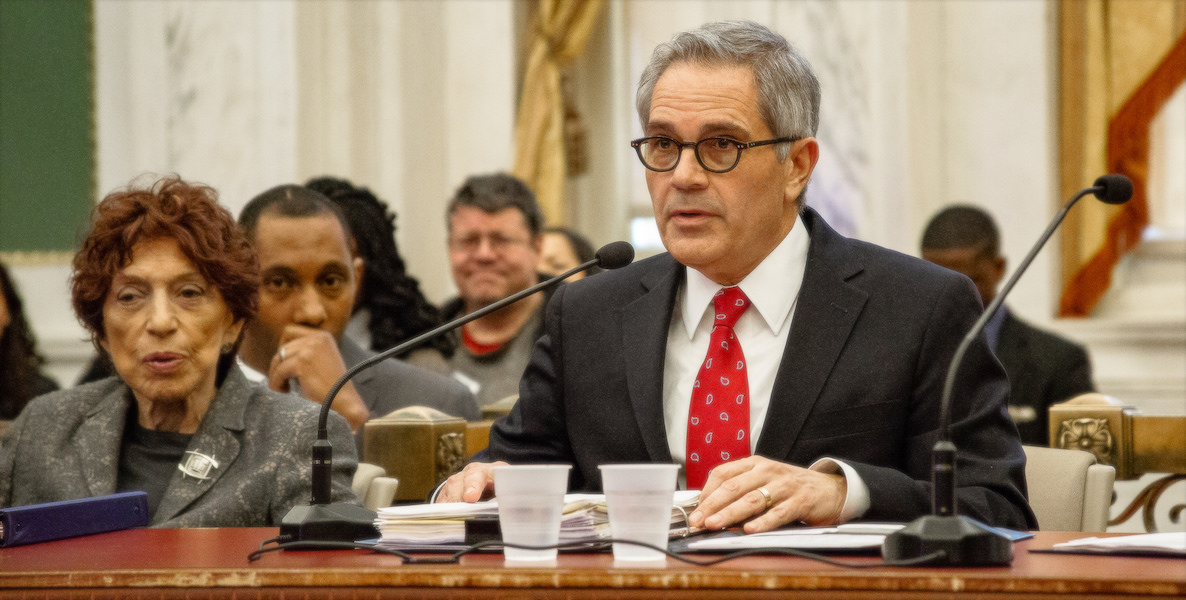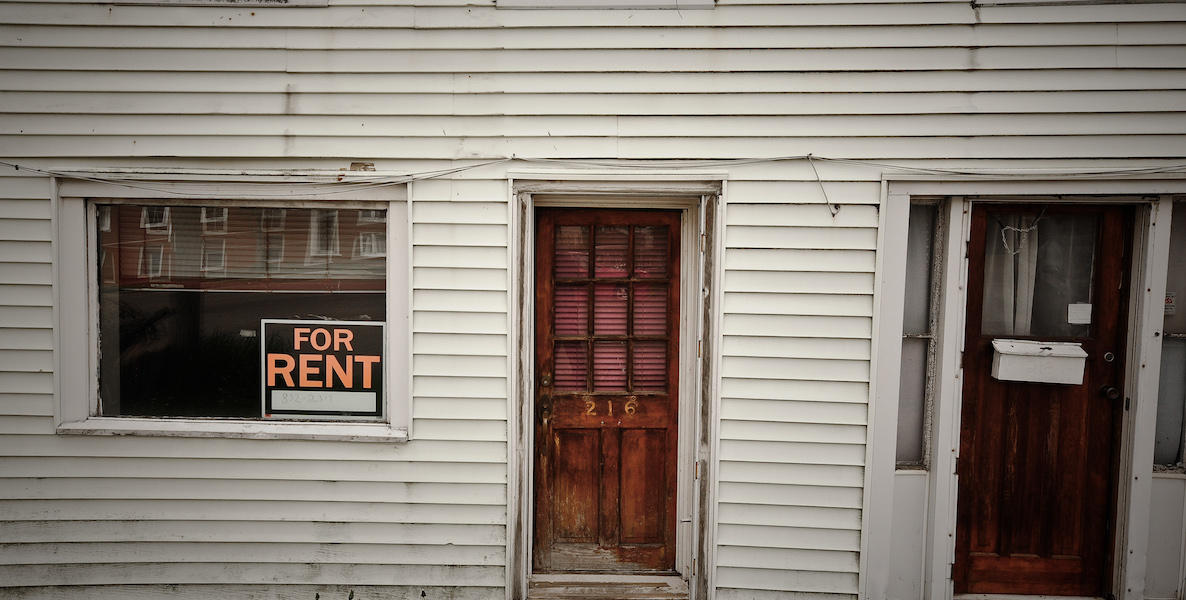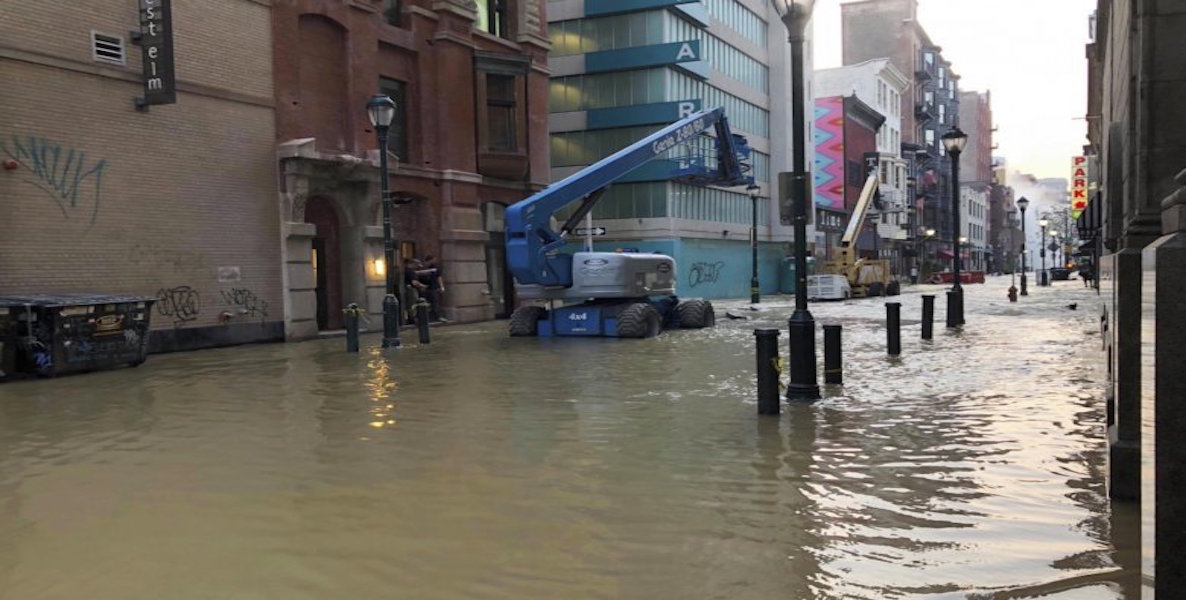It’s bizarre, really: In the public conversation over the Great Water Main Break of Philadelphia, there’s been scant—if any—conversation on the connection between that break and the Philadelphia Water Department’s (PWD) plan to increase water rates by 11 percent over the next two years.
We’ll know if that happens by Wednesday.
Sure, it’s not like this week’s Water, Sewer & Storm Water Rate Board proceedings (snoozy as that sounds) are as sensational as water rapids gushing through the middle of a large American city. In all the talk about how much Center City will be inconvenienced, how long it will take filling up that massive sinkhole on Sansom and Juniper streets, and how many businesses will be affected, local media has yet to bring up the sizable rate increases to pay for all of that and then some.
Nor will the Mayor and City Council, who could do city residents a good look by bringing that up, or members of Congress like Rep. Dwight Evans (D-PA). Everyone in leadership talks a nicely marinated gospel about the virtues of infrastructure and the need to invest in it. Yet, all go surreptitiously quiet at moments like these begging for that open talk with constituents about how crucial core infrastructure is and how everyone must figure out sensible strategies on paying for it.
Let’s make these investments, but let’s stop thinking that the only way we can get money for them is by haggling residents into living tighter than they already do.
And that’s because the big sacrifice on resident pocketbooks is happening again. The Water Department’s ask for the rate increase arises at a convenient time for the beleaguered agency—and a rather inconvenient time for those who live here. What the department suggests is an increase of about $116 million “… in operating revenues during the period of September 1, 2018 through September 1, 2021.” For users, that would translate into a 1.1 percent increase on Labor Day and an additional 5 percent by Labor Day next year, along with an added 4.5 percent on Labor Day 2020.
That’s a total of 11 percent in average water bill increases over the next two years. Non-residential customers, including businesses, would expect increases of nearly 15 percent over that same time period. That could be particularly tough for brick-and-mortar small businesses.
![]()
That massive water main break now raises the stakes for everyone. It offers the PWD just the perfect reasoning it needs to convince the board, policy makers and even over-billed residents that Philly’s very old water and sewage infrastructure is in desperate need of a big fix. Even though hearings for rate increases starting in September 2018 have been ongoing, pretty much unnoticed, since February, one can easily wager the PWD will put the water main break on full display at the final determination meeting on Wednesday, July 11th at 2pm, 1515 Arch Street, 18th Floor, Room 18-022 otherwise known as “The Glass Room.”
While the Glass Room moniker might suggest transparency, the process leading up to this moment has been anything but. Naturally, the dynamic in these proceedings could change dramatically by virtue of the recent Center City disaster. What was once just a routine, albeit significant, proposal for a rate increase now injects a sense of urgency that probably wasn’t there before. Water main breaks have been on the rise in Philly for some time, it’s nothing new. But a water main break in the very core of the city, where its political and economic power resides, suddenly illustrates the point in ways that weren’t so colorful before.
Just like the city’s attitude on it’s re-acquired school district, the only way city planners and policymakers can figure out how to pay for city infrastructure is to simply raise rates. Basically, more taxes on top of taxes. The similarities between the two issues are somewhat striking: Mayor Jim Kenney persists on politically holding “the kids” hostage as a way to justify property tax increases; the PWD, lifting from that same script, can simply argue this epic water main break and the monster sinkhole left behind will keep reoccurring if residents don’t open up wallets.
Rate increases come at a time when the city still struggles to grapple with its poverty problem, and while PWD continues implementing the country’s first Tiered Assistance Program for low-income customers. Meanwhile, residential water bills have increased by 30 percent since 2007.
The cycle continues. Everywhere residents turn, they get ceremoniously mugged. That’s as intense for the city’s economically distressed residents as it is for those who will grumble at an increase, but can still maintain.
That all said, Philadelphia sorely needs its infrastructure refreshed and fixed. It’s an old city that’s falling apart, even with all this building taking place in it—something that should have been considered before opening up the construction floodgates. PWD is, fundamentally, correct: we do need to make necessary investments in critical infrastructure, since water mains throughout Philly average about 70 or more years in age (that particular main on Sansom Street was about a century old).
The agency has moved in the right direction with projects such as the 25-year Green City, Clean Waters initiative and already rolling out phased investments over time—such as the $188 million already budgeted through 2021 for infrastructure projects; and some credit is due for showing some appreciation for the residential role in that. But, the Green City, Clean Waters production has already doubled in budget size to $4.5 billion over 25 years from the initial $2.4 billion projection. That’s not including the other $2.7 billion 6-year capital investment budget.
![]()
These are needed investments. But the question is: Why do city leaders and planners always turn to higher taxes and rates for big fixes? Rate increases come at a time when the city still struggles to grapple with its poverty problem, and while PWD continues implementing the country’s first Tiered Assistance Program for low-income customers that bases their monthly bill on their income. Meanwhile, residential water bills have increased by 30 percent since 2007, among the highest in the nation, which is crushing for some.
If infrastructure is so crucial then it should prompt demands for city government to put added pressure on builders, companies and business influencers in the city to help find solutions. Other cities around the country and the world have formed public-private partnerships to fund infrastructure fixes, including water systems; Lebanon, for example, has launched a joint effort to reinvent its water system and oversight to increase availability, jobs and safety. Where is that kind of solid public-private partnership here?
Or, Philly could look to our immediate south, where the city of Baltimore is part of a public-public partnership with neighboring communities to bundle contracts and procurement for infrastructure fixes.
![]()
Philly knows it has crumbling infrastructure everywhere, and the state overall gets a C- grade in its last Infrastructure Report Card, yet both city and state leaders are too afraid to ask major conglomerates who either base operations in Philly (or, maybe, want to) for set-aside coin on that infrastructure. There’s already mounting evidence from initial investigations of the Center City break that construction was a primary culprit; so, why not place greater expectations on builders who are actively disrupting, stressing and damaging core water infrastructure to absorb the brunt of those investments?
This is where revision of the property tax abatement could be useful; City Controller Rebecca Rhynhart’s report in April offered several ways to do that, raising in the neighborhood of $5 million. Perhaps some of that could go towards construction-related infrastructure fixes. Or perhaps City Council should revisit and expand its proposed 1-percent “Construction Tax” for a set period of time to help the city completely restore its near-ancient water infrastructure.
Philly has the right general idea on how to go about fixing its water network problems. No one is opposed to that. The problem here is that water main breaks shouldn’t mean the PWD and City Hall get full license to break resident pockets. Let’s make these investments, but let’s stop thinking that the only way we can get money for them is by haggling residents into living tighter than they already do.
Charles D. Ellison is Executive Producer and Host of “Reality Check,” which airs Monday-Thursday, 4-7 p.m. on WURD Radio (96.1FM/900AM). Check out The Citizen’s weekly segment on his show every Tuesday at 6 p.m. Ellison is also Principal of B|E Strategy, the Washington Correspondent for The Philadelphia Tribune and Contributing Politics Editor to TheRoot.com. Catch him if you can @ellisonreport on Twitter.






